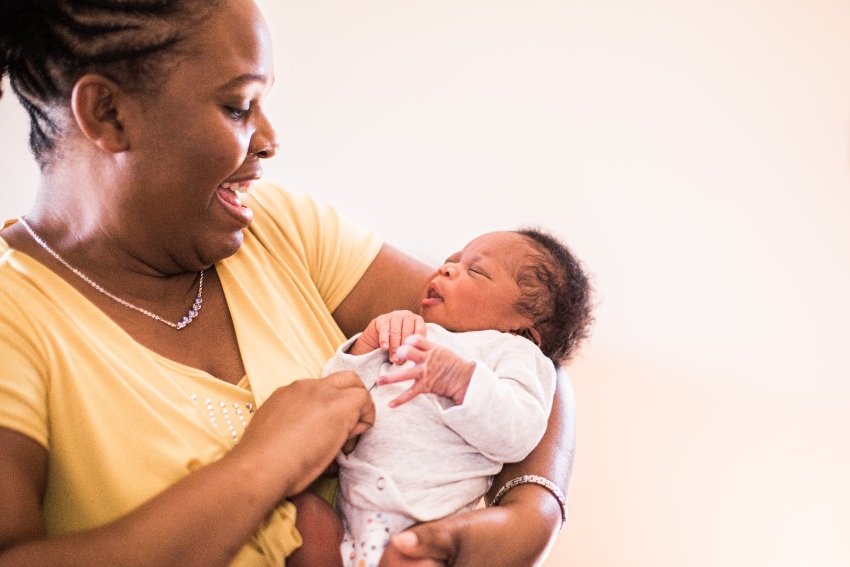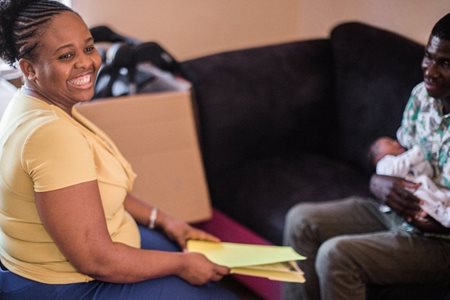5 October 2021
Lactation Class Helps Immigrant Mothers Face the Challenges of Pregnancy
By Kelly Davis
 Photos: Sofia Elizabeth Photography
Photos: Sofia Elizabeth Photography
Nahomie Labady was working on her final assignment for UC San Diego Extension’s Lactation Education Counselor course when one of her patients — a Haitian immigrant, like Labady — called to say she wasn’t feeling well.
Labady is a doula with Healthy Start San Diego; a program focused on improving the health of Black infants and their moms. As she listened to her patient’s symptoms, she recognized signs of postpartum pre-eclampsia, a rare condition that can develop shortly after childbirth. If not treated immediately, it can cause stroke and, in severe cases, death.
Suddenly Labady was juggling a number of issues. There’s a shortage of medically qualified Haitian interpreters, and Labady’s patient didn’t speak English. Due to the COVID-19 pandemic, the woman’s baby and husband couldn’t come into the hospital, so she was alone. Labady was on a deadline to finish the final assignment for her Lactation Education Counselor (LEC) course — and the patient was facing another significant health concern. The ER didn’t have a breast pump, and the woman’s painfully engorged breasts were adding to her distress.
It became an “all hands on deck” moment, said Lisa Bain, the director of Healthy Start San Diego. While Labady stayed on the phone to help interpret for her patient, Bain and Extension LEC instructor Alexandra Barrera called hospital staff to help find a breast pump and a nurse to assist. Everything ultimately worked out: Mom recovered, and she and her baby are doing fine, Labady says. And Labady was able to complete her assignment — and earn her certificate of completion.
Labady said it’s not unusual for the moms she works with to reach out to her before contacting other medical professionals. She speaks their language and understands their culture.
“If Nahomie wasn’t there, I shudder to think what would have happened,” Bain says.
The experience underscores just how precarious things can be for new immigrant mothers facing the myriad challenges of pregnancy, childbirth, and postpartum health in a foreign country. The U.S. has a shockingly high  infant mortality rate. Out of every 1,000 live births, roughly six infants won’t survive. The average infant mortality rate for other wealthy countries is 3.4 out of 1,000.
infant mortality rate. Out of every 1,000 live births, roughly six infants won’t survive. The average infant mortality rate for other wealthy countries is 3.4 out of 1,000.
For women and infants of color, the numbers are even more dire. Out of every 1,000 live births, around a dozen babies will die.
Healthy Start, a national initiative to eliminate disparities in birth outcomes, has been implemented by the humanitarian aid organization Global Communities in San Diego since 2007, Bain said. Babies who are breastfed have a significantly lower risk of infant death, so supporting families on their breastfeeding journey is key to addressing the issue.
A misconception about breastfeeding is that it’s easy and natural. But for many moms, it can be frustrating and painful. This is especially true for immigrants who might not have older family members around to provide advice and assistance.
Labady is one of two Haitian immigrants who’ve completed Extension’s LEC course, making Healthy Start the only program in the county that offers lactation support by women who are part of that community.
Labady, who speaks three languages, started as an interpreter for Healthy Start in 2019. She spent a lot of time translating at the Mid-City Community Clinic in City Heights, working with UC San Diego’s midwifery staff. That inspired her to go through the For the Village doula training program. A partner with Healthy Start, For the Village provides free doula services throughout San Diego County.
Labady saw that many of her patients struggled with breastfeeding. Though she’d never taken a college course, she decided to enroll in UCSD Extension’s Certified Lactation Education course. Offered quarterly, the program requires 45 hours of coursework that covers basics like the anatomy and physiology of lactation to mother-baby bonding to postpartum care.
Due to COVID-19 precautions, Labady took the course online. It was a bit challenging, she said, but she stuck with it because she knew the skills she was learning were needed.
“If you focus, you can do it,” she said.
Labady might see six or seven women a day and assist in two or three births a week. She’ll work with a family through pregnancy, delivery and 18 months of follow-up. Her work includes providing families with a full spectrum of support to ensure that infants thrive — she might help new parents sign up for medical insurance, procure a car seat or figure out how to navigate San Diego’s public transit system.
Bain describes Labady’s work as “life-changing for the community.”
“All these barriers” — language, cultural, transportation, childcare — “Nahomie has eliminated for her clients,” she says.